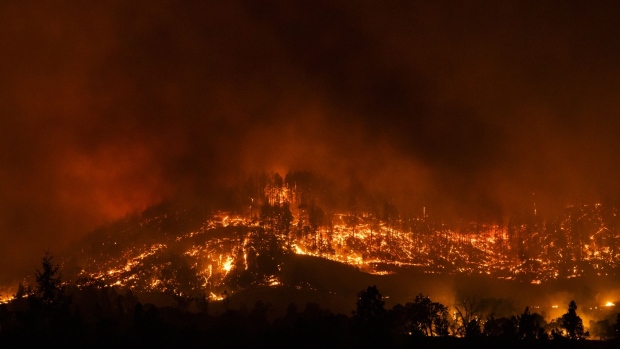Jul 2, 2021
Trudeau calls in crisis group as wildfires rage in Canada's west
, Bloomberg News

A protracted heat wave continues to fuel scores of wildfires in Canada’s western provinces, with Prime Minister Justin Trudeau calling an emergency meeting of a cabinet crisis group to address the matter.
Environment Canada issued heat warnings on Friday for most of the west, in addition to smoke warnings for parts of British Columbia’s interior and north as 119 active blazes spawned plumes of smoke. Fires forced a brief evacuation of part of Kamloops, a city of about 117,000 in the B.C. interior, and the government weather service said scorching temperatures there would remain into the weekend.
To the city’s southwest, a wildfire burned most of the village of Lytton to the ground earlier this week after days of hot weather, including the country’s highest-ever recorded temperatures at 49.6 degrees Celsius (121.3 degrees Fahrenheit).
Trudeau is convening a cabinet committee to discuss the situation and highlighted the need to continue tackling climate change. Unusual heat in B.C., Alberta and Saskatchewan is an example of how “extreme weather events are becoming more frequent,” he said Friday at a news conference in Ottawa.
“We’re going to be there to support people getting through this incredibly difficult time,” the prime minister said.
There are no immediate threats to oil and gas assets in B.C., but because of the volatile nature of wildfires, energy companies in the province have been notified and asked to prepare for the possibility of impacts, said Lannea Parfitt, a spokesperson for the B.C. Oil and Gas Commission.
In B.C., the heat wave is believed to have caused hundreds of deaths within the past week, according to the province’s coroners service. The extreme weather has extended to the east and the north: on Wednesday, Fort Smith in the Northwest Territories hit 39.6 degrees Celsius, the highest temperature ever recorded above 60 degrees latitude in the northern hemisphere, according to the Weather Network, a meteorological service.
Though the heat has eased somewhat since this week’s record highs, it hasn’t gone away. The heat warnings stretch as far north as the Yukon.
In the northern part of Saskatchewan, Cameco Corp. evacuated non-essential personnel from its uranium mine and suspended production because of a nearby fire on Thursday. The company said Friday that the fire had moved past the main camp area without serious impact, but it gave no timeline for the return of about 230 workers who were forced to leave.
In Alberta, the oil-rich province between B.C. and Saskatchewan, wildfires were not affecting oil or gas operations, which will continue to be monitored, said Derek Forsythe, a wildfire information officer.
--With assistance from Ari Hawkins, David R. Baker and Doug Alexander.








